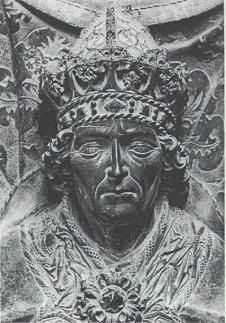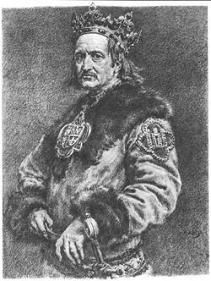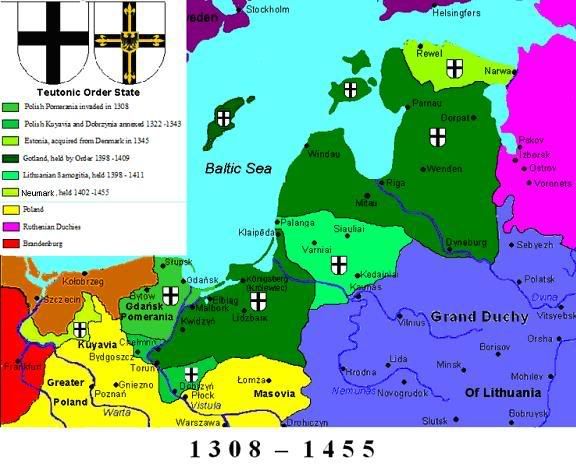Good introduction so far. Too bad that you have to fight with Poland, anyway - good luck 
The Ebony Cross and the Sacred Eagle (Era I)
- Thread starter unmerged(61606)
- Start date
-
We have updated our Community Code of Conduct. Please read through the new rules for the forum that are an integral part of Paradox Interactive’s User Agreement.
You are using an out of date browser. It may not display this or other websites correctly.
You should upgrade or use an alternative browser.
You should upgrade or use an alternative browser.
Impressive background - you've obviously put a lot of work into this.
IIRC, Tannenburg was before 1453 - it looks like the grudge match with the Poles has some time yet to run.
IIRC, Tannenburg was before 1453 - it looks like the grudge match with the Poles has some time yet to run.
yep, the Battle of Grunwald (Tannenburg) was around 1410.merrick said:Impressive background - you've obviously put a lot of work into this.
IIRC, Tannenburg was before 1453 - it looks like the grudge match with the Poles has some time yet to run.
that battle was the deciding factor in the Teutonic Order, and the outcome in this ARR will be MUCH different than real life...

Chapter I, Part III- Deus Vult!
With the victory over Poland, the Teutonic Knights established their dominance in the Baltic region.
This supremacy had even been foreseen by Holy Roman Emperor Louis VI.
In 1337 Louis IV (alternately named Ludwig the Bavarian) gave the Teutonic Knights imperial privilege to completely conquer Lithuania and Russia. Although the Ordenstaat would annex Lithuania, it never truly conquered Russia. With the decline of Novgorod in the late 16th century, the Knights would gain some Russian territory, but not as much as Louis IV had promised.
But there was a benefit. The province of Neva came under Teutonic control. This area would eventually grow into one of the greatest and most populous cities in the world. This city, St. Marysburg, would become a bastion of Teutonic, Russian, and other cultures.

(Holy Roman Emperor Louis VI)
Shortly after the cessation of war between Poland and the Teutonic Knights, a new Grand Master came into power. He was Winrich von Kniprode, the 22nd Grand Master of the Teutonic Knights. And at holding his position for thirty-one years (1351- 1382), von Kniprode was the longest-serving Teutonic Grand Master of all time. During his reign the Ordenstaat fought many small, brutal wars with the Grand Dutchy of Lithuania—which was pagan at the time—to connect the western territory to Livonia.
Under von Kniprode, the Teutonic State reached a new height in international standings. Great amounts of foreign crusaders and nobles visited the Ordenstaat. Some came to help with the wars against Lithuania and Poland. Others came to see the wonders of the country.
Regardless, the Teutonic Knights relentless expanded their territory. In the late 1390s Sweden ceded Gotland as a fiefdom. This agreement was reached on the terms that the Teutonic Knights would expel the Victual Brothers, a band of privateers turned pirates.
The only major city on the island was Visby, which served as the Victual Brothers’ capital. Under Grand Master Konrad von Jungingen, and invasion army of Teutonic Knights captured Gotland. Visby was looted and razed to the ground. The Victual Brothers were slaughtered and driven off of Gotland. Any survivors were executed. Eventually the Brothers were rooted entirely out of the Baltic Sea.
The conquest of Gotland marked the first of the Teutonic Knights’ overseas possessions. After the loss of the Outremer to Muslim invaders, the Ordenstaat had been left with only their continental, Baltic land. However, with the acquisition of Gotland the Knights gained the first of their many overseas territories.
But even before the conquest of Gotland, the Teutonic Knights were putting their full efforts into Christianizing Eastern Europe, by both diplomacy and the sword. Under Grand Master Conrad Zöllner von Rothenstein (served 1382- 1390), diplomat relations between the Ordenstaat and Lithuania greatly improved.
In 1386 Jogaila (later named Władysław II Jagiełło) of Lithuania was baptized. He was inducted into the Roman Catholic Christian Church (also the official religion of the Ordenstaat). After his baptism, Jogaila married Queen Jadwiga of Poland. It was then that Jogaila changed his name—to Władysław II Jagiełło— to better reflect his Polish ties.

(King Władysław II Jagiełło)
This marriage heralded a Personal Union between Lithuania and Poland. Apart from the resulting military alliance, this also forged an extremely formidable enemy for the Teutonic Knights. To counteract this threat, von Rothenstein played Jagiello and his cousin Vytautas against each other.
This political trickery soon crumbled when Vytautas suspected that the Teutonic Knights planned to annex some of his territory. But Vytautas soon too converted to Catholicism.
Lithuania gradually but steadily converted to Christianity. With the conversion of Lithuania and Prussia, the casus beli for the Baltic Crusade was over. But even religious uniformity could not stop the old hatreds. War would time an again flare up between the Ordenstaat, and the Poland-Lithuania alliance.
To combat perceived Teutonic aggression, four men took action. Prussian nobleman (with a Polish ethnicity) Nicholas von Renys, John of Pulkow, Frederick of Kitnow, and Nicholas of Kitnow came together in Chełmno Land one night in 1397. They formed the Lizard Union, an organization of Prussian and Polish nobles and Knights. Officially—on the surface—its goal was to fight against lawless and piracy in both Teutonic and Polish territory. However, it had a hidden, more sinister goal. The Lizard Union planned to cause Chełmno Land to be annexed into Poland. However, after Teutonic victory in the Polish-Lithuanian-Teutonic War, von Renys was executed and the group dissolved.
But a small group of noblemen posed little thread to the legendary Teutonic Knights. After the foundation of their own state in the Baltic region, the Knights had never been defeated in a war. Their reputation was one of invincibility. This would server them well in the years to come.
By 1407 the Teutonic Knights had achieved their greatest territorial expansion thusfar. Their control was over the lands of Prussia, Pomerelia, Samogitia, Courland, Livonia, Estonia, Gotland, Dagö, and Ösel. In addition, Grand Master von Junginen had purchased the Neumark from Brandenburg in 1402.

(Growth of the Teutonic State, 1308- 1455)
Many were predicting the downfall of the Teutonic State. Under the Union of Krewo—the personal union created by the marriage of Grand Duke Jogaila of Lithuania and Queen Jadwiga of Poland—the Polish and Lithuanian armies each readied for war.
At the same time, the Ordenstaat was waging a Crusade of their own. The Christian Knights wanted to destroy the pagan Lithuania, and convert the population.
But Grand Duke Jogaila accepting Christianity upon his marriage with Jadwiga, the rationale for the Teutonic aggression was gone. However, this would not deter the Knights. In 1398 the Ordenstaat began military raids across the borders with Poland and Lithuania. Although there was no formal declaration of war, the Knights conducted attacks on border towns and castles.
But the Union of Krewo could not retaliate. At the close of the 14th century neither of these countries had sufficient military forces, or money and supplies to fund them. So they could not respond with force to the Teutonic aggression.
These border clashes quickly escalated into war. In a short, decisive struggle, the Teutonic Knights once again emerged victorious. Their demands: Lithuanian Samogitia. After this war, peace was maintained due to the actions of several very skilled diplomats. But even they could not hold the peace forever.
This supremacy had even been foreseen by Holy Roman Emperor Louis VI.
In 1337 Louis IV (alternately named Ludwig the Bavarian) gave the Teutonic Knights imperial privilege to completely conquer Lithuania and Russia. Although the Ordenstaat would annex Lithuania, it never truly conquered Russia. With the decline of Novgorod in the late 16th century, the Knights would gain some Russian territory, but not as much as Louis IV had promised.
But there was a benefit. The province of Neva came under Teutonic control. This area would eventually grow into one of the greatest and most populous cities in the world. This city, St. Marysburg, would become a bastion of Teutonic, Russian, and other cultures.

(Holy Roman Emperor Louis VI)
Shortly after the cessation of war between Poland and the Teutonic Knights, a new Grand Master came into power. He was Winrich von Kniprode, the 22nd Grand Master of the Teutonic Knights. And at holding his position for thirty-one years (1351- 1382), von Kniprode was the longest-serving Teutonic Grand Master of all time. During his reign the Ordenstaat fought many small, brutal wars with the Grand Dutchy of Lithuania—which was pagan at the time—to connect the western territory to Livonia.
Under von Kniprode, the Teutonic State reached a new height in international standings. Great amounts of foreign crusaders and nobles visited the Ordenstaat. Some came to help with the wars against Lithuania and Poland. Others came to see the wonders of the country.
Regardless, the Teutonic Knights relentless expanded their territory. In the late 1390s Sweden ceded Gotland as a fiefdom. This agreement was reached on the terms that the Teutonic Knights would expel the Victual Brothers, a band of privateers turned pirates.
The only major city on the island was Visby, which served as the Victual Brothers’ capital. Under Grand Master Konrad von Jungingen, and invasion army of Teutonic Knights captured Gotland. Visby was looted and razed to the ground. The Victual Brothers were slaughtered and driven off of Gotland. Any survivors were executed. Eventually the Brothers were rooted entirely out of the Baltic Sea.
The conquest of Gotland marked the first of the Teutonic Knights’ overseas possessions. After the loss of the Outremer to Muslim invaders, the Ordenstaat had been left with only their continental, Baltic land. However, with the acquisition of Gotland the Knights gained the first of their many overseas territories.
But even before the conquest of Gotland, the Teutonic Knights were putting their full efforts into Christianizing Eastern Europe, by both diplomacy and the sword. Under Grand Master Conrad Zöllner von Rothenstein (served 1382- 1390), diplomat relations between the Ordenstaat and Lithuania greatly improved.
In 1386 Jogaila (later named Władysław II Jagiełło) of Lithuania was baptized. He was inducted into the Roman Catholic Christian Church (also the official religion of the Ordenstaat). After his baptism, Jogaila married Queen Jadwiga of Poland. It was then that Jogaila changed his name—to Władysław II Jagiełło— to better reflect his Polish ties.

(King Władysław II Jagiełło)
This marriage heralded a Personal Union between Lithuania and Poland. Apart from the resulting military alliance, this also forged an extremely formidable enemy for the Teutonic Knights. To counteract this threat, von Rothenstein played Jagiello and his cousin Vytautas against each other.
This political trickery soon crumbled when Vytautas suspected that the Teutonic Knights planned to annex some of his territory. But Vytautas soon too converted to Catholicism.
Lithuania gradually but steadily converted to Christianity. With the conversion of Lithuania and Prussia, the casus beli for the Baltic Crusade was over. But even religious uniformity could not stop the old hatreds. War would time an again flare up between the Ordenstaat, and the Poland-Lithuania alliance.
To combat perceived Teutonic aggression, four men took action. Prussian nobleman (with a Polish ethnicity) Nicholas von Renys, John of Pulkow, Frederick of Kitnow, and Nicholas of Kitnow came together in Chełmno Land one night in 1397. They formed the Lizard Union, an organization of Prussian and Polish nobles and Knights. Officially—on the surface—its goal was to fight against lawless and piracy in both Teutonic and Polish territory. However, it had a hidden, more sinister goal. The Lizard Union planned to cause Chełmno Land to be annexed into Poland. However, after Teutonic victory in the Polish-Lithuanian-Teutonic War, von Renys was executed and the group dissolved.
But a small group of noblemen posed little thread to the legendary Teutonic Knights. After the foundation of their own state in the Baltic region, the Knights had never been defeated in a war. Their reputation was one of invincibility. This would server them well in the years to come.
By 1407 the Teutonic Knights had achieved their greatest territorial expansion thusfar. Their control was over the lands of Prussia, Pomerelia, Samogitia, Courland, Livonia, Estonia, Gotland, Dagö, and Ösel. In addition, Grand Master von Junginen had purchased the Neumark from Brandenburg in 1402.

(Growth of the Teutonic State, 1308- 1455)
Many were predicting the downfall of the Teutonic State. Under the Union of Krewo—the personal union created by the marriage of Grand Duke Jogaila of Lithuania and Queen Jadwiga of Poland—the Polish and Lithuanian armies each readied for war.
At the same time, the Ordenstaat was waging a Crusade of their own. The Christian Knights wanted to destroy the pagan Lithuania, and convert the population.
But Grand Duke Jogaila accepting Christianity upon his marriage with Jadwiga, the rationale for the Teutonic aggression was gone. However, this would not deter the Knights. In 1398 the Ordenstaat began military raids across the borders with Poland and Lithuania. Although there was no formal declaration of war, the Knights conducted attacks on border towns and castles.
But the Union of Krewo could not retaliate. At the close of the 14th century neither of these countries had sufficient military forces, or money and supplies to fund them. So they could not respond with force to the Teutonic aggression.
These border clashes quickly escalated into war. In a short, decisive struggle, the Teutonic Knights once again emerged victorious. Their demands: Lithuanian Samogitia. After this war, peace was maintained due to the actions of several very skilled diplomats. But even they could not hold the peace forever.
Last edited:
Great! Looking forward to the future of the Teutons! Are you planning to secularize the order at any point?
Just wanted to let you know that I found this. Haven't read yet, but I will get there. BTW, that had to be the ugliest eagle in the world in that first picture. I swear he looks constipated. 
nope, never!Nikolai said:Great! Looking forward to the future of the Teutons! Are you planning to secularize the order at any point?
no, diareah.grayghost said:Just wanted to let you know that I found this. Haven't read yet, but I will get there. BTW, that had to be the ugliest eagle in the world in that first picture. I swear he looks constipated.
exactly.thrashing mad said:Ahh, so in next chapter battle of Tanenberg.
Great update indeed! but it's just one thing..
Prussian and Polish nobles and nights.
I didn't known Nights could form organizations, or even talk. :wacko:
Prussian and Polish nobles and nights.
I didn't known Nights could form organizations, or even talk. :wacko:
whoops!Prinz Wilhelm said:Great update indeed! but it's just one thing..
Prussian and Polish nobles and nights.
I didn't known Nights could form organizations, or even talk. :wacko:
EDIT: fixed now.
Is this still historical? I hadn't realised the Order was quite that great a Power.
Of course, if this is historical, the smash is just around the corner.
Of course, if this is historical, the smash is just around the corner.
IMO most of it has been pretty much historical so far....merrick said:Is this still historical? I hadn't realised the Order was quite that great a Power.
Of course, if this is historical, the smash is just around the corner.

